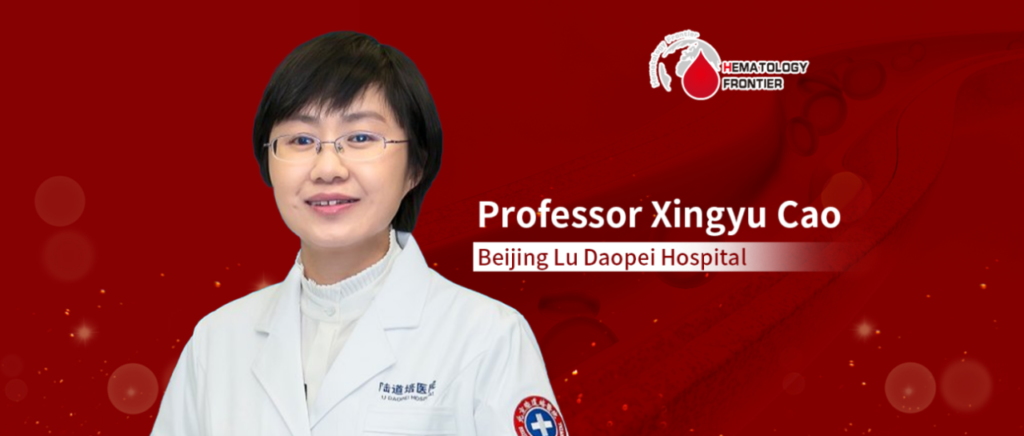
Editor's Note: Relapsed/refractory acute T-cell lymphoblastic leukemia/T-cell lymphoblastic lymphoma (r/r T-ALL/LBL) presents significant treatment challenges with poor prognosis. Data show that the 5-year survival rate is less than 25%, and even with salvage allo-HSCT, the 3-5 year survival rate is only 14-30%. Improving survival for these patients has become a hot research topic. Recently, Professor Xingyu Cao's team at Beijing Lu Daopei Hospital conducted a study using CD7 CAR-T combined with allo-HSCT to treat r/r T-ALL/LBL, achieving notable efficacy and reliable safety. This study was published in the British Journal of Haematology (BJH). Oncology Frontier - Hematology Frontier interviewed Professor Cao to discuss the treatment of r/r T-ALL/LBL. Here are the details.Oncology Frontier – Hematology Frontier: Your team recently published a study in BJH on the use of CD7 CAR-T combined with allo-HSCT to treat relapsed/refractory acute T-cell lymphoblastic leukemia/T-cell lymphoblastic lymphoma (r/r T-ALL/LBL). Could you introduce this study?
Professor Xingyu Cao: The prognosis for patients with acute T-cell lymphoblastic leukemia/T-cell lymphoblastic lymphoma (T-ALL/LBL) after relapse is very poor, with long-term survival rates around 30%. Although new drugs, such as novel targeted therapies and monoclonal antibodies, have improved remission rates, long-term survival remains unsatisfactory. Our previous research showed that CD7 CAR-T therapy achieved high bone marrow remission rates exceeding 90% in r/r T-ALL/LBL patients. Even patients with central nervous system (CNS) involvement and those with extramedullary infiltration (including those with large masses) had remission rates over 60%. This increased remission rate allows more patients to receive allo-HSCT. Additionally, earlier clinical studies indicated that r/r T-ALL/LBL patients who achieved remission without bridging to allo-HSCT had poor long-term survival, whereas bridging to allo-HSCT significantly improved long-term survival. Our study aimed to analyze factors affecting the long-term survival of r/r T-ALL/LBL patients undergoing allo-HSCT after CD7 CAR-T therapy, such as whether CD7 CAR-T increases post-transplant infection rates and relapse-related mortality, with the ultimate goal of improving treatment efficacy for these patients.
Oncology Frontier – Hematology Frontier: allo-HSCT plays an indispensable role in the treatment of ALL. Exploring the impact of CD7 CAR-T therapy on transplant outcomes is crucial. Could you elaborate on the study design and main results?
Professor Xingyu Cao: This study was based on data from previous clinical trials and compared r/r T-ALL/LBL patients who received CD7 CAR-T therapy followed by allo-HSCT with those who achieved remission through chemotherapy before undergoing allo-HSCT. The results showed that the efficacy of allo-HSCT in r/r T-ALL/LBL patients who achieved remission through CD7 CAR-T was comparable to those who achieved complete remission (CR) through chemotherapy followed by allo-HSCT. There were no significant differences in granulocyte/platelet engraftment rates and times, post-transplant CMV and EBV infection and activation rates, long-term survival rates, relapse rates, and non-relapse mortality (NRM) between the two groups. Notably, the CD7 CAR-T combined with allo-HSCT treatment strategy doubled the long-term survival rate of r/r T-ALL/LBL patients, increasing it from 30% to around 60%, significantly improving survival rates.
Oncology Frontier – Hematology Frontier: The study indicates that CD7 CAR-T therapy followed by allo-HSCT is effective and safe for r/r T-ALL/LBL patients, achieving results comparable to those who achieved CR through chemotherapy without increasing NRM. What is the significance of these findings for future research and clinical practice?
Professor Xingyu Cao: Indeed, our study demonstrates that CD7 CAR-T therapy is safe for r/r T-ALL/LBL patients, not increasing transplant-related risks (such as infections and transplant-related microvascular diseases) after allo-HSCT. Additionally, CD7 CAR-T therapy achieves high remission rates, allowing more patients to undergo allo-HSCT, thereby improving survival rates, especially in younger patients with r/r T-ALL/LBL. Data show that their 2-year survival rate exceeds 80%, which is an excellent outcome. Therefore, we strongly recommend CD7 CAR-T combined with allo-HSCT as a standard treatment option for young r/r T-ALL/LBL patients.
Oncology Frontier – Hematology Frontier: CD7 CAR-T therapy is still in clinical trials. What further steps are necessary to bring CD7 CAR-T therapy to clinical practice? What are your team’s future research plans?
Professor Xingyu Cao: Based on current research, the overall efficacy and safety data of CD7 CAR-T are promising. Whether it can be approved for clinical practice depends on further exploration by CAR-T development companies and the completion of the approval process. We are eagerly anticipating CD7 CAR-T becoming an effective treatment option for r/r T-ALL/LBL. Regarding future research plans, optimizing preconditioning regimens to reduce NRM in patients receiving CD7 CAR-T combined with allo-HSCT and further improving survival rates are key focus areas for our team.


